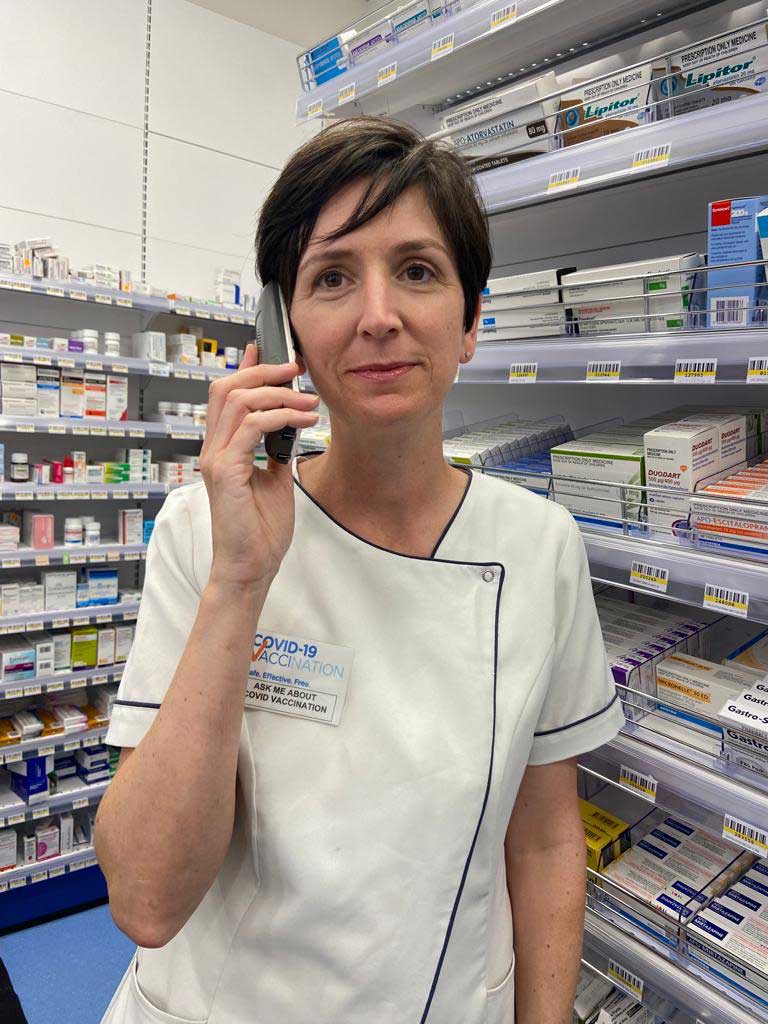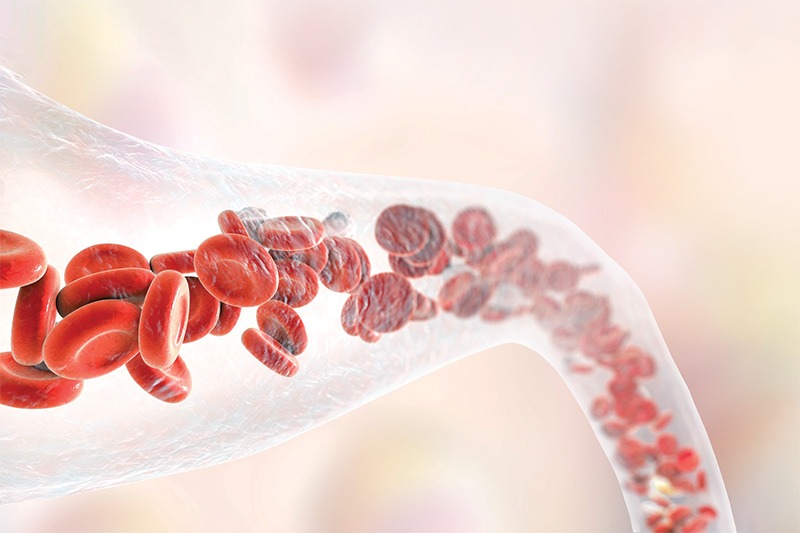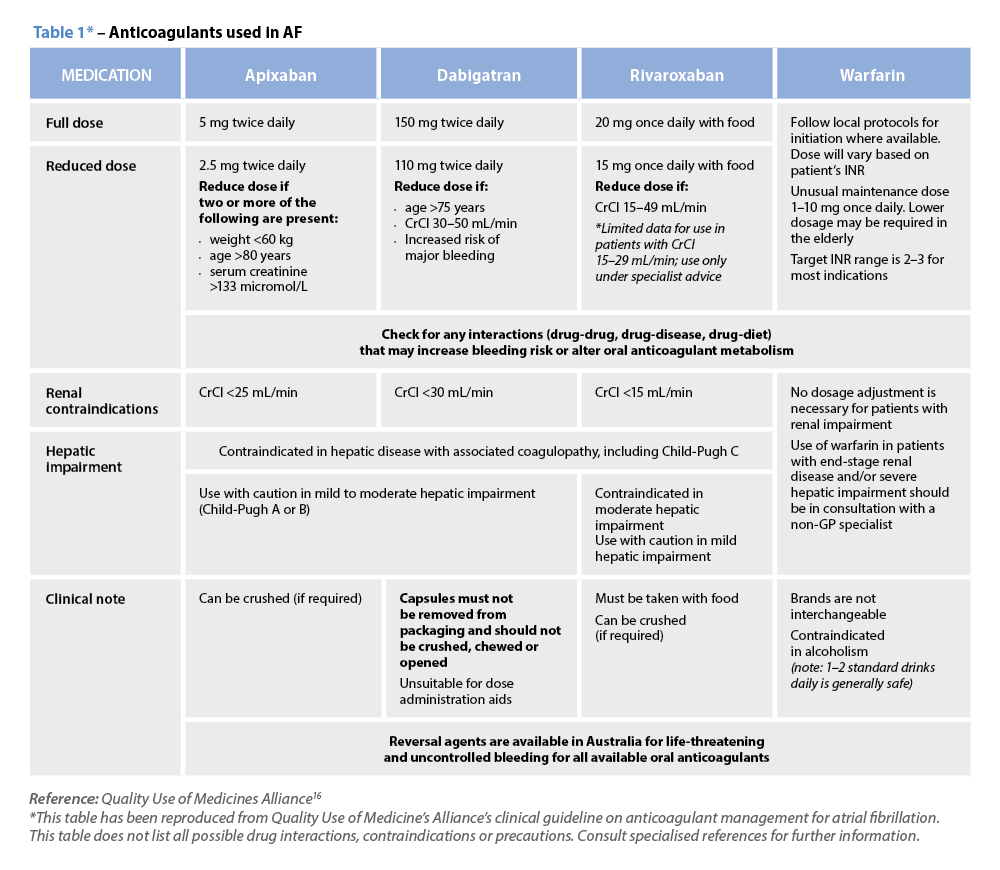Jennifer Cooke, the Editor of Australian Pharmacist, talks with Katherine Higgins MPS, a pharmacist in South Perth, Western Australia.
Her brother in England has had long COVID for about 18 months and is finding it increasingly difficult to function at work.

Jennifer Cooke: Can you tell me a bit about your brother’s situation?
Katherine Higgins MPS: My story is a personal family connection. It’s not a local one. I’m an Irish resident living in WA and I did my training in the UK and moved here in 2009. So, my story is about my brother who lives in London, so I don’t have any [local] connection with a local long COVID case because we don’t have too many in WA effectively. I suspect in the eastern states in some months’ time, we’ll know a lot more about it. We’ll hearing a lot more about it.
So, what I can tell you my brother’s case – April 2020 with no underlying comorbidities, 39 years old. He got COVID when London would have been, you know, awash with it. Symptoms were very mild. A couple of weeks later, tend to be finished.
But then he began to just experience a few residual respiratory symptoms like shortness of breath, exercise intolerance. And then, you know, fatigue. At that point in the UK, more and more people were presenting with similar kind of long COVID symptoms and were starting to present. Fatigue, brain fog, and some tinnitus in his ears were his main long COVID symptoms initially, and nowhere really to go I think was the message, you know. They weren’t, they were obviously, you’re trying to scramble with the acute scenario of COVID and that kind of thing. So, all of his attention in the UK, he very much sought out privately himself. You can have ME/CFS specialists in Austria, those kinds of things, to no great avail.
And then he had his first Pfizer vaccination, and he was okay and then had his second Pfizer vaccination in very early July this year. And his immune system has had a phenomenally negative response to that. So, he went into massive, acute flare.
So, he has so he has this Postural Orthostatic Tachycardia Syndrome, dystonia or just whatever. So, some shortness of breath, his fatigue is chronic, brain fog is chronic, dizziness, vertigo symptoms, you name it, peripheral neuropathy. You know the very much top to toe. He’s been living with this since April 2020, essentially. I mean, I know there are various pockets of trials or research going on about it but …
Q: What is ME?
A: Myalgic Encephalomyelitis. Your chronic fatigue, the correct term for chronic fatigue syndrome. I think, just from a personal perspective, the devastation that this can cause for somebody and, obviously, his mental health is greatly affected now by it, and as are lots of people in his situation …
The only avenue for them, again, which reminds me a lot of the people with chronic fatigue very often left behind, unheard, conventional medicine doesn’t really know what to do with them, and as far as I can sort of make out based on his frustration certainly with the NHS. Yes, they’ve set up COVID clinics, but there’s no real specific advice. They seem to be very obviously hesitant in the UK to repurpose drugs or use drugs off-label for it. Whereas in the [United] States, in different jurisdictions, there may be a bit more freedom in the same to do that. And that could be similar here. So, in Germany, there’s a treatment for long Covid. It’s called apheresis. So, it’s a bit like renal dialysis where they take the blood out, remove the plasma or clean it. So, this idea being that there are micro clots. Yes, so I mean, obviously we know about clotting with COVID itself, but then for long COVID they’re again unsure of all of the pathways going on, but this idea of post inflammation and these residual cytokines leaving micro clots in his system – hence the whole kind of vascular-type symptoms like your peripheral neuropathy in the hands and feet and stuff like that. In his situation, and like many others, I’m getting that there’s a lot of frustration because there’s no real urgency yet to help these people.
Q: Sounds like a looming health disaster.
A: In Australia, we’ve been very insulated from it, particularly in Western Australia, so nobody really knows the language unless they’ve got relations overseas. So, obviously, that’s helpful to get it out to people from the point of view a) the importance of vaccination, which, yes, you may still get a breakthrough infection, but your chances of getting long COVID, which doesn’t seem to discriminate. It can be those who are fit young and healthy, get it mildly or those who obviously are very acutely unwell with this.
Q: There doesn’t seem to have any rhyme or reason. It hits randomly.
A: I know they are scrambling to figure it out. My role, with a medical hat on, I can just advise him. And he started going down very much a route that is very much off his own bat because in the UK he’s not getting any kind of willing participation from doctors.
Q: Has he gone to one of those COVID clinics?
A: Yes, he did go to those long COVID clinics. And the message was graded exercise and cognitive behavioural therapy. He’s very disproving of that because exercise makes things worse for him. And that’s a lot of what I gather from other long COVID people when they do too much, a bit like your chronic fatigue syndrome people, that you pay for it greatly because it takes a long time to recover. I understand recently that NICE in the UK have only recently changed their CFS guidelines to remove the advice about graded exercise from there because, again, you could just research that yourself. So that’s kind of interesting.
[Patients] they’re very frustrated, concerned about the long-term health burden unknown health outcomes down the track these people and they’re really desperately trying to help themselves.
Q: So, what does your brother do? Is he in the medical field as well?
A: He’s a financial guy, a hedge fund manager. In the last week, he has come to the realisation that he has to give up work because his ability to concentrate now because of this brain fog. Yes, so it’s, it’s very impactful and that’s devastating for somebody like him or anybody.
Q: He has got to retire, or just can’t do that high level hedge fund work anymore?
A: Well, this is the unknown. He’s going to have to sit down and discuss what his ongoing options are.
Q: So unknown. It’s a new disease?
A: So, me as a health professional, I try to advise him on some of his drugs and interactions and side effects and then also, I guess, a health professional and as a family member, I think it’s more the challenge of helping somebody manage their mental health. So, trying to remain hopeful is probably the one word I use – positive – that that you know, something will… [happen] that with the number of people that this is going to affect globally, that there has to be, well, one would hope … something.
But it’s not very straightforward. There’s a lot of suggestions as to what this has done to one’s immune system, and so on, post-infection.
Q: And so, having got this news, you thought Australian Pharmacist should be on to this subject?
A: I suppose floating around the concept of it, so that we’re, we’re a bit more familiar, but I suppose the trick is to you what can you kind of reference with certainty in an article to direct people. Well, I was interested to know, obviously, what’s been coming out of all our journals today for the last year and a half its obviously, you know, the global story with the treatment options available. And obviously now, you know, we’ve all focused heavily on the importance of vaccination which we are doing a great job, but poor renumeration for.
But what next? This is next. How do we help people when they come into the pharmacy with it? And right now, that’s very difficult because we can’t direct them to a designated you know [place]. I think they’ve recognised, the WHO and I think the RACGP. They’ve got a definition for it now, but what happens next?
For somebody who in his case, who’s accomplished as he was in the financial world, you know, worked for a leading global hedge fund and has been really successful, is able to achieve and so on, and now has something that they have no control over. And I think it’s obviously the impetus for [patients] seeking out, realising that you have to seek out all of your own treatment. But I can understand, you know, obviously being a health professional when people are desperate and scared. And this IS scary because we don’t know what it’s doing. We don’t know the long-term effects and you can only hope that with the volume and the number of people affected globally that something will come of it.
But what about these early people all of him and [others] exposed, what for them? Where can they go? There is not going to be – I think that’s the point – there’s not going to be, you know, guidelines and protocols available because they don’t know what to do. We don’t have years of trials and papers and things. And I think that’s where the medical world is going to have to change. Things are going to have to change. There seems to be old drugs that we can try to repurpose. We’ve got all of this, you know, ability to do – there’s lots of machine learning now, which could solve some of that for you in selecting medicines that may work. But it’s all very complicated and unknown.
Q: So, what specifically do you tell your brother? Don’t exercise too much?
A: It’s very much a kind of a pastoral role. I listen. It’s the idea and knowing that mental health is fragile … remain hopeful, you cannot give up hope. Be as positive as you can. He has found some benefit in, meditation, I guess. But he’s dramatically changed his lifestyle and I think it’s trying to accept this.
You’re well and fit and healthy and then the next thing you’re struck down which is unfortunate for people who get diagnosed with a chronic condition. But for most of the chronic conditions that we know of, we have a treatment or a plan or, you know, an idea of remission. These people don’t. They’re isolated, totally isolated, I think, depending on where you are, and it’s massive. I now have so much more empathy for all of these chronic fatigue syndrome people who again, have sought out their own groups and forums and, all these people who are post viral [from] conditions in the past.
And yet, they’re no better off. Ironically, this is going to bring more I think attention and highlight to them because there seems to be some similarities between chronic fatigue syndrome and long COVID But yet, as yet not all fully understood.
Q: I think what you said about the pastoral role is very important and interesting and might be a way into this. And, you know, the fact that your brother is, you know, a very smart guy, high level finance, etc.
A: He’s obviously got the smarts to go and seek out information to try and understand it.
Q: There are three points here. There’s a pastoral role for pharmacists, they listen because they’re [patients] are going to vent at someone aren’t they? They may only get six-minute medicine with the GP.
A: I was just going to say, ideally, walk in and you can have 20 minutes of my time while still, you know, for you to come back time with not so busy when we won’t be renumerated.
Q: You’ve [as a patient] got to make your own suggestions or seek out your own treatments because it’s so early in this, even though overseas it’s been going for probably a year, and they have set up clinics and there’s an NHS plan etc, which I’ve read about. It’s still not really helping yet, it seems.
A: Not it’s not. I’m getting the frustration from him and others like him and because, you know, the system the NHS is still very much overwhelmed and but with acute people and post-[infection] all that and then, you know, waiting to see some of these people in these clinics, but yet there isn’t a chance yet taken on trying to repurpose any of these drugs.
Q: And the symptoms are also disparate. There’s no one drug that’s going to treat all of that stuff – fatigue, anxiety, brain fog, headaches. That is actually very, very helpful … I’m just trying to find what the role of the pharmacist is here because there clearly will be a role. But what is it and is there one that’s already been established by anyone? And so, you’ve just told me about what you’ve created for your brother. And he can do that with his pharmacist in England as well, can’t he? Has he has he found one or because you’re there, he can just ask you, I guess?
A: I guess it’s more that you know, as a family member, I’m available. But there are others like him who are their own paths, you know. It will be quite difficult again, for pharmacists to comment on meds, you know, it might be [that] some might feel burdened by, you know, jurisdiction and lack [of evidence]. There’s no paper or evidence that they’re going to be able to cite and back up the information. So, this is where it is going to be interesting if people like them and there are 1000s if not millions who are seeking out the wrong treatment and using medicines off label, and if they are coming to pharmacists, you know, how are they [pharmacists] going to be called to be able to advise them? You know, it’s different for me because this is obviously a very personal situation. It’s my brother.
Q: Can I just ask, Katherine, where do you work?
A: I work in community pharmacy in South Perth in WA. I suppose I’m selected as the pharmacy manager.
My brother, I feel is probably one of the, you know, the smaller percentile who’s had such bad luck about the length of time [he’s had long COVID] and then, however, his immune system responded to the second vaccination. There’re some reports that some people with long COVID … their symptoms improved when they had their vaccinations, and a small percentage, disimproved and he’s certainly in that bracket – his symptoms got worse. When he had his vaccine, he disimproved.
Q: Have you been a pharmacist for long?
A: I qualified in 1998 when I did my degree in London, and then I worked, worked at the community for a hospital pharmacy first and then went and did community back in Ireland. I’ve come from a family of pharmacists and then moved Australia in 2009.
Q: All those people [elsewhere] that may come into the pharmacy and say, “I’m not sleeping well, I’m trying to exercise, these headaches that have been going on ever since I had this – I either had COVID or something like it last year”. And so, what would that conversation trigger in a pharmacist?
A: Well, I suppose that’s the thing. I guess it’s possible that you might be suffering from long COVID. But then where do you tell them to go – so you go see a GP?
Q: A specialist, rehabilitation person or ….
A: But yet, this is, again, all the early cohort, these people.
Q: There’s no [clear] pathway yet?
A: No, there isn’t. So, I think you know, so a message out that people are seeking their own treatment and way for this, you know, whether it be advised or not advised, but I can certainly understand that, if your life has dramatically changed and you can’t do basic functioning, then you can’t blame these people for doing it [seeking off-label] treatments.
Q: No, well, they clearly do need help. Life has changed. So clearly, it’s an advice role, or a referral role [for pharmacists]? I suppose the first thing is the GP and then he’s got to refer them to a specialist anyway – if there’s something majorly wrong in some particular system (of the body).
A: Yeah, I mean, I imagine initially, it will require lots of investigation, like blood work, or maybe specific, specific investigations for things and so on.
Thanks for speaking with Australian Pharmacist.




 ‘We’re increasingly seeing incidents where alert fatigue has been identified as a contributing factor. It’s not that there wasn’t an alert in place, but that it was lost among the other alerts the clinician saw,’ Prof Baysari says.
‘We’re increasingly seeing incidents where alert fatigue has been identified as a contributing factor. It’s not that there wasn’t an alert in place, but that it was lost among the other alerts the clinician saw,’ Prof Baysari says.


 Beyond the arrhythmia, AF often signals broader pathological processes that impair cardiac function and reduce quality of life and life expectancy.5 Many of these conditions are closely linked to social determinants of health, disproportionately affecting populations with socioeconomic disadvantage. Effective AF management requires addressing both the arrhythmia and its underlying contributors.4
Beyond the arrhythmia, AF often signals broader pathological processes that impair cardiac function and reduce quality of life and life expectancy.5 Many of these conditions are closely linked to social determinants of health, disproportionately affecting populations with socioeconomic disadvantage. Effective AF management requires addressing both the arrhythmia and its underlying contributors.4  C – Comorbidity and risk factor management
C – Comorbidity and risk factor management Warfarin
Warfarin



